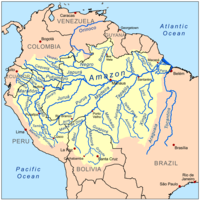
The Amazon River is the longest, mightiest river in the world. Its headwaters lie in the Andes of Peru but numerous rivers of the Amazon Basin drain into the Amazon River as it meanders towards the Atlantic Ocean. The Amazon Basin, or Amazonas, is massive, comprised of seven countries – Bolivia, Colombia, Ecuador, Guyana, Peru, Suriname and Venezuela.
Amazon, the company is, according to Wikipedia, the world’s largest e-commerce marketplace and the largest Internet company by revenue in the world. In the United States, Amazon is the second largest employer. By being the greatest in the world — the Amazon of online retail — Amazon’s founder (Jeff Bezos) realized a dream. Recently, the countries of the Amazon Basin have learned how deep Amazon’s influence runs. Deeper, perhaps, than the Amazon River.
When Amazon tried to purchase the .Amazon top level domain name, Brazil and Peru protested, arguing that the domain name did not belong to a company. In a complaint with The Internet Corporation for Assigned Names and Numbers (ICANN) the countries argued:
Granting exclusive rights… to a private company would prevent the use of this domain for purposes of public interest related to the protection, promotion and awareness raising on issues related to the Amazon biome … It would also hinder the possibility of use of this domain to congregate web pages related to the population inhabiting that geographical region.
In effort to compromise, Amazon reportedly offered the governments of Brazil and Peru $5,000 worth of Kindles and Amazon Web Services. Ecuador’s response was that the issue was one of sovereignty, not compensation. Seven years later there was no resolution to the dispute.
The Amazon Cooperation Treaty Organization (ACTO), a group of South American governments with high regard of the Amazon (the River), authored a strong reprimand of ICANN for its attitude in the negotiations which they alleged were overtly one-sided. The parties, however, could not settle their differences. According to the Mashable, Amazon the company made the following offer:
[Amazon] promised not to include in domain names words with “a primary and well-recognized significance to the culture and heritage of the Amazonia region”. The company said it would block the use of up to 1,500 such sensitive names. Additions to the list of terms, which would be overseen by a joint advisory committee, would be allowed for up to two years.
Amazon also promised to provide nine domain names that ACTO could use for non-commercial purpose. ACTO members rejected the offer because they had no right to veto specific names. Amazon responded that it could not share ownership of the .amazon domain. And so, it doesn’t. ICAAN sided with Amazon, finding that its most recent offers were an acceptable compromise. Brazil responded:
It is concerning that a decision by that entity fails to adequately consider the public interest identified by eight governments, in particular the need to defend the natural, cultural and symbolic heritage of the countries and peoples of the Amazon region.
ICAAN’s decision is lamentable. Amazon is all about selling stuff. ACTO is about protecting national heritage. To ICAAN, selling stuff appears more important.
— Adam G. Garson, Esq.

